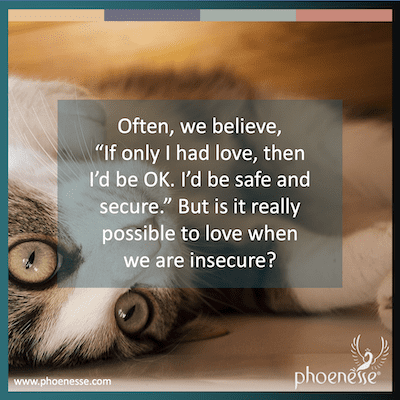
Often, we believe, “If only I had love, then I’d be OK. I’d be safe and secure.” But is it really possible to love when we are insecure?
The five stages of love
For many millennia, humans have been on the hunt for something: security. Feeling insecure, in fact, is the greatest driver behind all the misery we inflict upon ourselves. Why? Because we search for it in the wrong way. We’re hoping that all our fears, anxieties and uncertainties can be taken away from the outside. By loving.
But then, if this does ever happen, it doesn’t last. The result? We become disappointed, even more insecure, and then hopeless we’re ever going to find it. And we’re back to where we started, now also searching for relief from the letdown.
As long as we are preoccupied with finding security on the material side of life, we don’t even realize there is another kind of insecurity to consider. It’s only after we achieve some level of material security that this other gnawing feeling of inner insecurity pipes up, clamoring for attention.
Typically, we’ll try to drown out this voice using distractions and evasions, both of the pleasurable and the painful variety. But eventually we are forced to face our inner uncertainties. We’re going to have to ask ourselves questions we’ve never dared ask before. Like, what exactly am I so insecure about?
The realistic way out of our insecurities is to face them, admit them and accept them. Or at least that’s a start. Then we’ll need to sift through our inner errors and misunderstandings until we find the solid ground upon which we can withstand the storms of life.
So is that what we usually do? In a word, no.
Instead, we try to escape from ourselves. Some of us might do this by doing good. Others might throw themselves into valuable scientific work or artistic expressions. In and of themselves, such endeavors are constructive of course, and can be of great help to others and society.
Nonetheless such noble efforts must get tucked under the heading of Escape because security can never be found outside the self. Yet all too often we drown out our inner insecurities while performing such tasks. As such, these aren’t real solutions to the very real problem so many face: Serious Insecurities.
Worse, these precarious attempts to cover up deeper issues can—and often do—fail when something goes wrong. And let’s face it, in life, things invariably go wrong.
So what’s the answer…stop doing good works? That’s not necessary. They can surely be continued while we work to establish a firmer center of gravity within.
What does loving look like?
Often, we believe if only we had love, then we’d be OK. We’d be safe and secure. But let’s be honest, is it really possible to love when we are insecure? Frankly, it’s not. For if we are highly insecure, we are unable to trust ourselves. And how can we love someone we can’t trust? Going a step further, if we don’t yet have self-love, we’ll be hard-pressed to love anyone else. We simply can’t give what we don’t have. Inner security, then, is a bit of a big deal.
But let’s not be too hasty here, for love happens in degrees; it’s not a question of either/or. In fact, there may be areas in a person that are secure and therefore capable of loving. But to the extent that insecurity is also present, the soul lacks the capacity for loving.
Let’s take a look at the Love Scale so we can get a sense of where we fall in our current love capacity.
The love scale
1) Love for inanimate objects
Right out of the gate, when we are just getting rolling in loving, we are at the stage of having love for things, love for inanimate objects. This is the lowest position on the scale and there are plenty of people who don’t dare go any further. If this is us, our love for our house, our car, our clothes or our stuff in general, is our sole outlet for loving.
The beauty here is that objects don’t oppose us. In that regard, they make themselves easy to love. They don’t ask us to figure out what they’re feeling. They never disapprove of us or criticize us. Best of all, they don’t ask much in the way of making a personal sacrifice. Objects never make demands on us.
2) Love for abstract ideas, principles, art, nature
Next up on the Love Scale is love for abstract ideas, principles, art and nature. We can put love for our profession in this category. Loving an abstract idea moves the mind or spirit in at least some small measure, even if it still avoids personal involvement as well as any associated risks. It may, however, involve some level of personal contact or confrontation with others who have differing opinions. This makes it more outgoing than the isolating pursuit of loving mere objects.
3) Love for plants and animals
From here we move onto having love for living creatures other than humans: plants or animals. They are going to require a certain amount of effort and sacrifice, asking us to put aside our immediate selfish comforts, at least once in a while. This is the case if the love is active and not just a theoretical “I love the woods.”
At this level, we still don’t have to face rejection or to ponder the needs of another, or to make the effort to come to some kind of mutual understanding. To a small degree, this might apply if we are caring for an animal, but that’s nothing like what’s required when we are in a close relationship with another person. There, our senses must be alert to both the other person’s needs and to our own. Pets, by comparison, are a more simple matter.
4) Love for humankind
Next on the Love Scale is love for humankind as a whole. This is moving in the right direction, but we’re still not being asked for much personal involvement. As such, this level of loving, while not very taxing, is also not the most fulfilling. Nonetheless, there may need to be some thought and effort made, some willingness to get outside oneself and sacrifice a bit. These are highly constructive attitudes as long as one actually puts them into practice and doesn’t just talk a good game.
5) Love for a person
Highest on the Love Scale is the love for individuals in close, intimate relationship. This is the most constructive of all the levels, requiring us to tune into ourselves as well as to another human being. This also makes it the most challenging. Even though we may be involved in relationships in which love is demonstrated by turbulent means—which of course has nothing to do with genuine love, indicating immaturity and dependency and often leading to ruptures and disharmony—that doesn’t altar the truth that we are still furthering our ability to love.
So while a life filled with upsetting relationships will indeed not be as harmonious as the life of a loner or a hermit, the opportunity for inner growth is there. Take note that it’s not possible to gauge a person’s inner development by their apparent outer harmony. Looks can be deceiving.
Turbulence, then, is not the litmus test for whether we’re making progress in moving along on the Love Scale. Perhaps we find it easy to cope with certain difficult people, but then we dread being around others. If that’s the case, we need to look at whether we are running away from the very area where we need the most growth. Quick, surface evaluations can be misleading.
It’s important that we question all our fears and insecurities, probing into our reactions to the aspects of love that we hope to avoid. This is the way to uncover truthful answers. Doing so will not harm us, even if we decide we’re not ready to take on a relationship that seems threatening to us. Then at least we will be clear and honest with ourselves about the level we have reached so far on the Love Scale.
Where is love for God?
You may have noticed that love for God is conspicuously missing from this list. Would you put it under Love for Abstract Ideas and Principles? Or maybe it belongs on the very highest level of the scale?
It turns out, love for God can be healthy and genuine, but it can also be an escape.
If love for God is for real, it will manifest through our love for others with whom we are able to communicate and to relate. And of course this can’t happen unless and until we overcome our many fears and vanities. So our work must involve finding and dissolving the obstructions in ourselves that make us unwilling to love another person.
If love for God is for real, it will manifest through our love for others with whom we are able to communicate and to relate.
In truth, there’s really no need to occupy our minds with speculations about that which we can’t conceive or comprehend: The existence of the creator of everything, including spiritual beings. So we’re better off having the humility to admit the limitations of our understanding and turn our attention to something we can learn about, namely how to give and receive love with other people.
This means it’s entirely possible that someone who is a died-in-the-wool nonbeliever is actually closer to loving God than someone who “loves God!” An atheist may take on the taxing task of mutual growth, while the “believer” may hide behind an abstract God-idea that can’t really be understood by the limited human mind.
In the end, the only way for us to get closer to experiencing God is for us to heal and grow, removing our inner walls and liberating our feelings.
So if our love for God is not an inner experience, arrived at through personal self-development, then it’s really the pursuit of an idea. This puts it squarely in the camp of Love for Abstract Ideas. That’s a two on the Love Scale, which is a far cry from Love for a Person, which is a five.
Indeed, our most enduring and profound security lies in our ability to be in truth. Doing so requires that we become willing to look within, finding and resolving all areas of untruth. And when we do that, we are performing the most loving act of kindness we could ever do for ourselves.
—The Guide’s wisdom in Jill Loree’s words

Next Chapter • Return to Contents
Read Original Pathwork® Lecture: #105 Humanity’s Relationship to God in Various Stages of Development
We Can Heal | After the Ego • Blinded by Fear
Real. Clear. series | Holy Moly • Finding Gold • Bible Me This • The Pull • Pearls • Gems • Bones • Nutshells
All essays | Get a Better Boat • Living Light • Latest essays
Self. Care. series | Spilling the Script • Healing the Hurt • Doing the Work
More books | Walker • Word for Word • Spiritual Laws • Keywords



